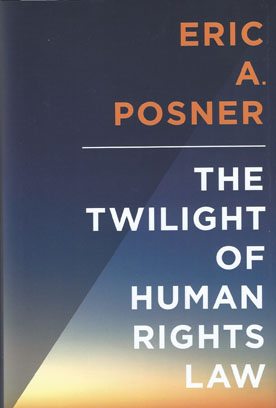
In Twilight of International Human Rights Law, acclaimed legal scholar Eric Posner seeks to explain a paradox: the language of human rights is now the dominant mode of international moral criticism of governments, and yet the evidence suggests that most countries flagrantly violate the human rights treaties that they solemnly ratify.
The prevailing consensus, he notes, is that governments should promote the well-being of citizens in their countries, and that in extreme cases, foreign countries should intervene and replace governments that fail to comply with this duty. The problem, he contends, is countries disagree on how they can achieve those goals. This weakness is on full display in existing human rights treaties, and the result is a general failure. Because countries have not been able to agree about 'well-being,' they ended up negotiating treaties that are vague and (by design) unenforceable.
In addition, countries have ensured that international organizations possess weak enforcement powers. Moreover, when enforcement does occur, it is invariably partial and scattershot. In whack-a-mole style, target countries can compensate for addressing some violations by reducing their compliance with other norms that are not the focus of enforcement. Posner closes by arguing that foreign aid provides a better model for pressuring governments to improve their treatment of citizens.
Under the foreign aid regime, western countries look at overall indicators of well-being in other countries-such as per capita GDP-and offer aid based on whether it is likely to help people escape poverty. Governments that make progress in reducing poverty should be deemed in compliance with their human rights obligations, and we should not waste time trying to enforce more specific rights like freedom of the press or the right to privacy.
In addition to offering a powerful and provocative thesis, this is a concise introduction to international human rights law. Posner describes the major treaties and the major international organizations; the evidence regarding the effect of human rights treaties on the behavior of governments; and recent international controversies over human rights such as the United States' use of torture, China's persecution of political dissidents, and the debate over the alleged right against defamation of religion.